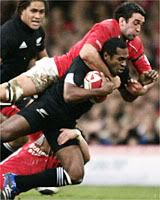Motorsports: Aussie V8's in Bahrain; MotoGP Champion Nicky Hayden to Have Shoulder Surgery
 Photo: Getty Images
Photo: Getty ImagesThe Australian V8 Supercar series, featuring highly modified Holden Commodores and Ford Falcons, is production-based road racing Aussie style. In an effort to expand the international appeal of the series, they have moved into the Middle East with the inaugural race having taken place in Bahrain this weekend. Singapore, Malyasia, Thailand, and South Africa are possibly in the series' future as well.
Go here for news and results of all three races of the Bahrain round.
Here's a little background on Aussie V8 Supercars I wrote at the old blog:
V8 Supercar racing is all about factory wars, just like in the US (except here they turn left and right), and it is the classic Ford vs. GM contest- with a twist. While Ford has chosen to remain "Ford" all over the world, GM does business in Australia and NZ as Holden, after having acquired the Aussie brand and bringing it further into the GM fold. These cars are amazing performers. Weighing around 2800 lbs, developing 600-650 hp with fuel injected 5.0 liter V8's (rev limited to 7500 RPM), and 6-speed gear boxes, they hit zero-to-60 in just under 4 seconds and can hit top speeds of 185 mph, depending on the track. At Pukekohe they were hitting about 175-180 MPH on the back straight. And they stop and turn pretty well, too.In other V8 Supercar news, the New Zealand round will see the last of its races held at Pukekohe Raceway south of Auckland next year, with the city of Hamilton, about 60 miles south, replacing it in 2008 with a street course.
The successful bid by the Hamilton City Council to construct a 3.4km track that borders the city's CBD has effectively saved New Zealand's future in the Australian series.Just one more race from the awesome Phillip Island circuit in Melbourne remains on this year's calendar.
V8 officials have become increasingly frustrated with the inadequate facilities at Pukekohe raceway just outside of Auckland, this year's race marred by a high-speed crash which broke a photographer's leg and a section of spectators in the main grandstand almost crushed by a support series car.
Hamilton event promoter Dean Calvert, who also chairs the Pukekohe race, said winning the rights for a street race had saved the event for the country.
"We knew that had this not been successful, then the V8 Supercar Championship, which is being courted by countries around the world, would not return to our country," Calvert said.
*********************************************
 Photo: MotoGP
Photo: MotoGPIn case you don't follow MotoGP, the Formula One for motorcycle racing, American Nicky Hayden won the championship this year in one of the most exciting and closest seasons in a long time. After a brilliant start early in the season with a few podium finishes, it looked like Nicky would, as the late 7-time NASCAR champion, Dale Earnhart, once put it, "second and third 'em to death." But a mid-season slump saw others, including Italy's Valentino Rossi, multi-time champion and uber-god, close the gap. As a result of being taken-out by his own Repsol Honda team mate, Dani Pedrosa, on the fourth lap of the panultimate round in Estoril, Portugal, Nicky actually trailed Rossi going into the final round at Valencia, Spain. Rossi crashed out early in the race, and Hayden clinched the title.
But due to a previous injury, Nicky will need surgery on his right collarbone:
MOTOGP champion Nicky Hayden is set to have an operation on his right collarbone in San Francisco in the coming days.I hope the surgery is successful and Nicky comes back next year stronger than ever to defend his title when the bikes change from the current 990cc engine displacement to 800cc's.
Hayden broke his right collarbone during a practice session in 2004, and his accident during the penultimate grand prix of the season, at Estoril in Portugal on October 15 this year, saw him re-injure the bone.



